A New Look for Bonj les Bains: Meet Hvar Beach Club
July 6, 2021 - Looking for an upscale beach experience in Dalmatia this summer? Check out the revamped Hvar Beach Club.
The water is pristine, the temperature ideal, the views divine. Summer on the island of Hvar is hard to beat.
But where to go to laze away the day by the water? Hvar is blessed with plenty of bays and coves where you can escape the crowds and be at one with nature. But if you are looking for a touch of pampering, there is one address you should become acquainted with - the newly revamped Hvar Beach Club just below Hotel Amfora in Hvar Town. And it is a beach club with quite a history.
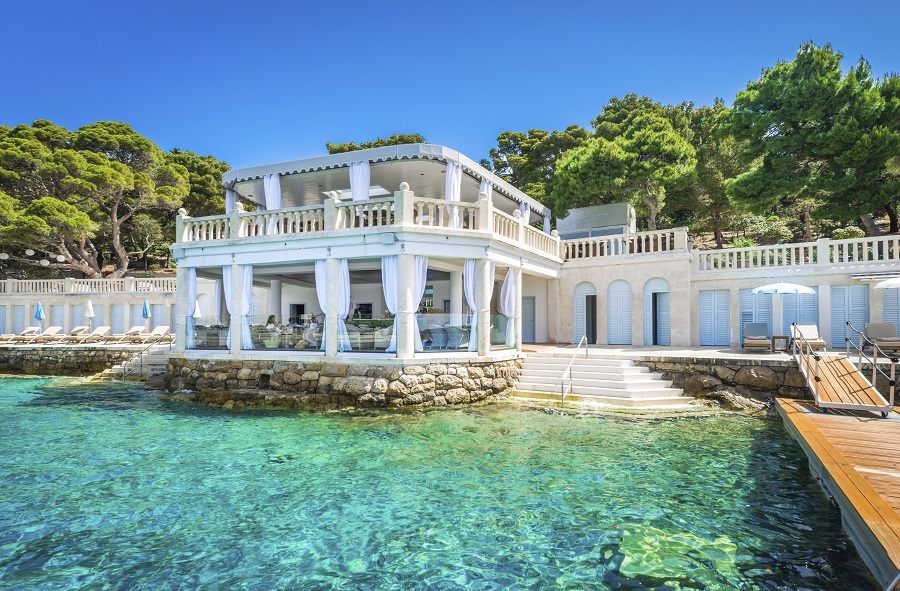
The Beach Club Hvar Experience
Established in 1927, Beach Club Hvar is the synonym for luxury, lavishness and style. Completely renovated in 2021, this timeless club provides a haven for those seeking unpretentious luxury. Nestled just a short stroll from the city center in one of the most picturesque parts of Hvar, Beach Club Hvar boasts eye catching architecture and unbeatable sea views. With its prime location and rich history, it is considered the quintessential Hvar landmark since its inception.
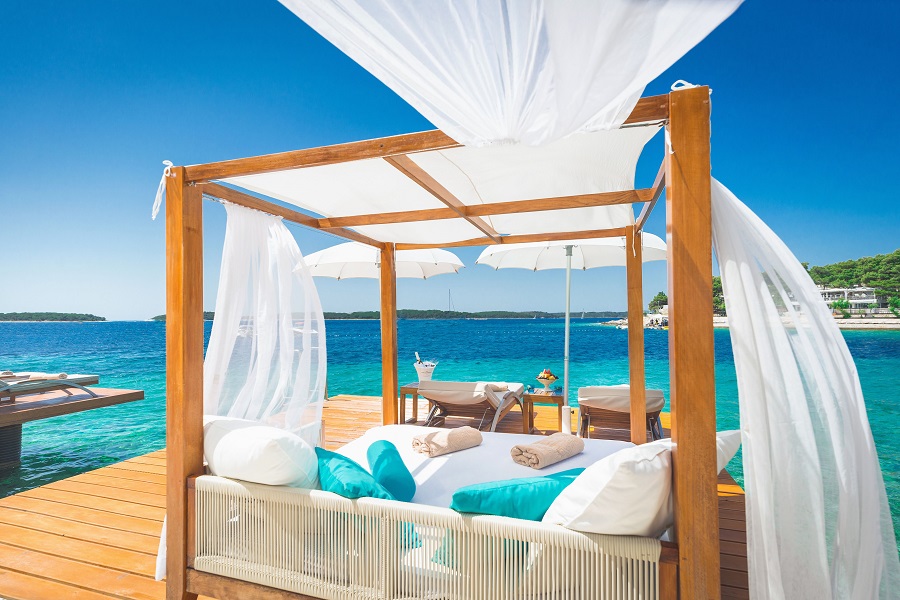
This summer, guests are invited to enjoy new private air-conditioned relaxation quarters available to those seeking more privacy during their stay. Little luxuries include two sunbeds with direct access to your suite, one bottle of Prosecco, Ischia - facial water mist, seasonal fruit platter, private safe, mini bar with water set up and free wi-fi access.
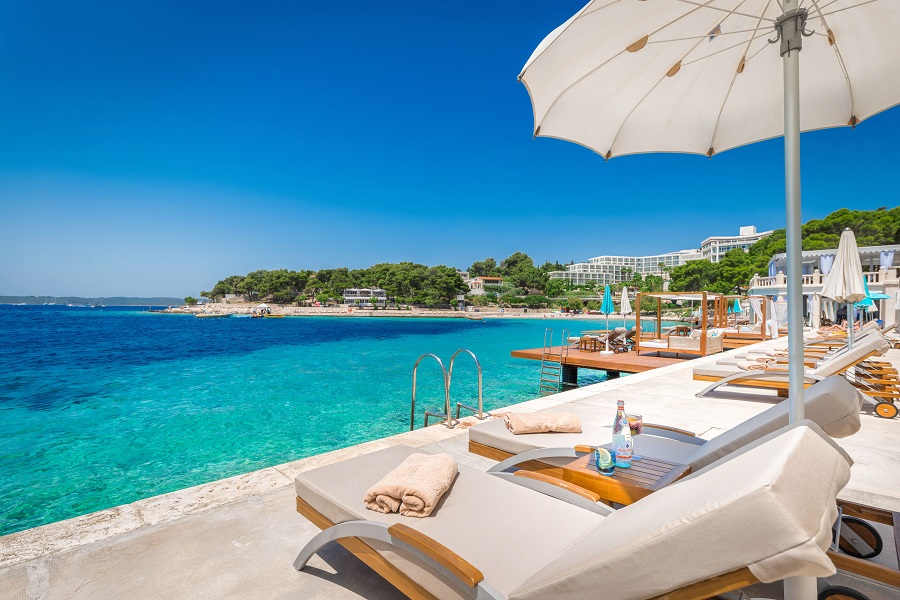
Beach Club Hvar also features brand new pontoons. So if you are travelling with friends, an over water private deck with baldachin style bed for two and four individual sunbeds is the way to go! Soak up the sun on luxurious day beds while enjoying lunch and creative cocktails.
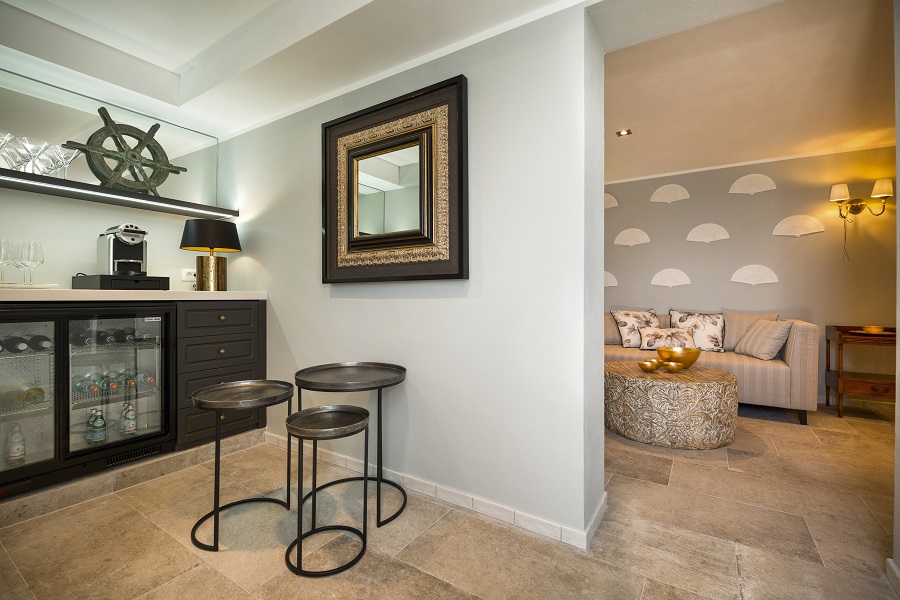
The menu is curated to focus on Mediterranean dishes that are light, fresh and creative. You may dine in the restaurant or have healthful salads, freshly caught seafood entrees or small bites directly delivered to your sunbed.
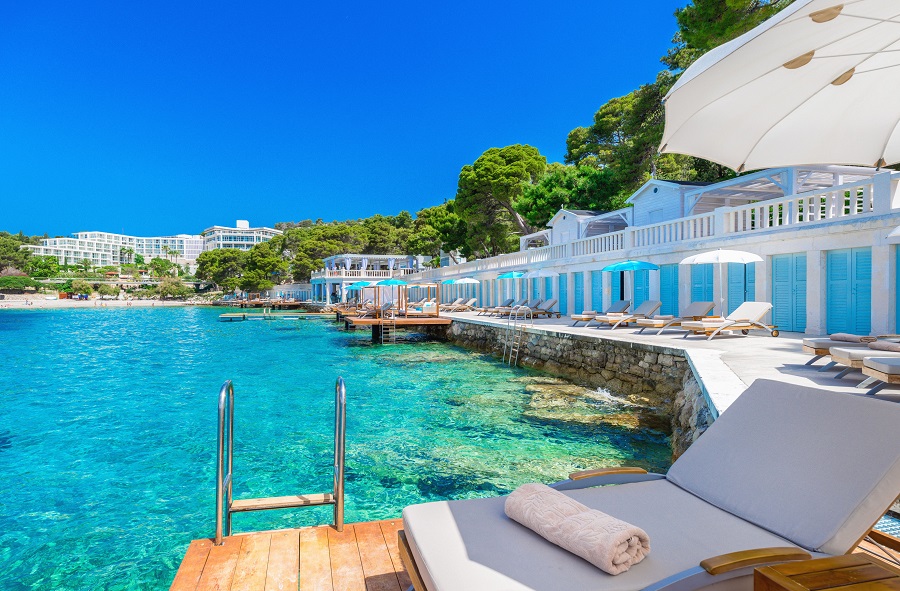
The newest luxury is the exclusive Spa offer. The spa offers a comprehensive menu of facials, massage and body treatments designed to meet the needs and goals of each quest. Refresh the mind and revitalize the body with bespoke experiences and treatments.
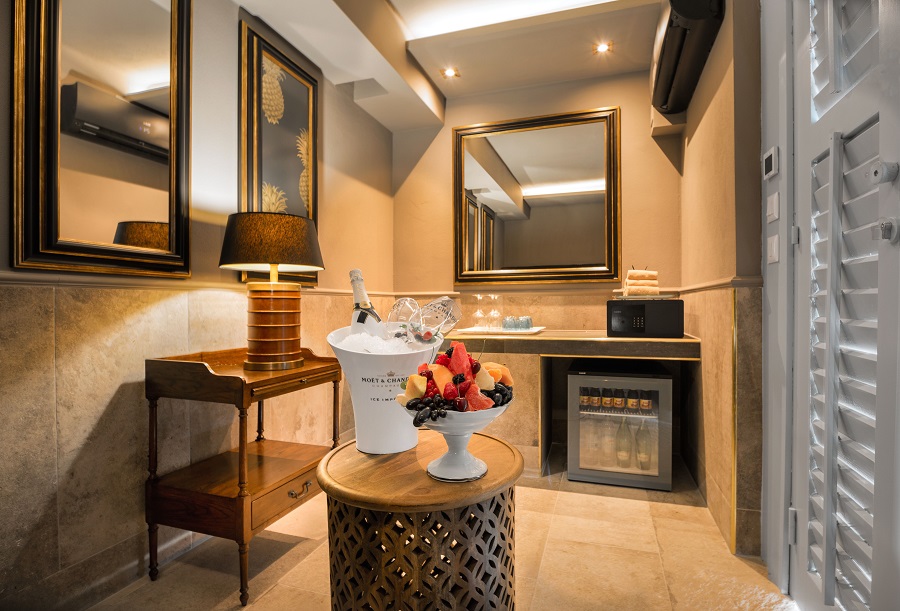
Moreover, you can complete your beach look with sophisticated and elegant beach items. Shop for beautiful Hvar inspired swimwear from bikinis to sleek one-piece swimsuits; a wardrobe must-have during the summer time! This stylish and inspirational beach items will make each woman feel beautiful in their own skin.
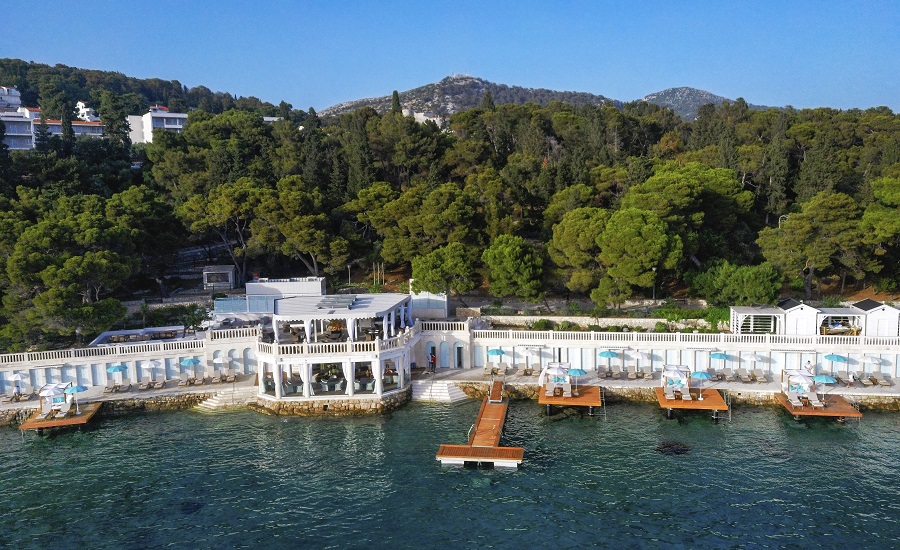
A little bit about the club’s history.
Beach Club Hvar has nearly a century of remarkable history and unsurpassed style. Previously known as Bonj ‘les bains’, it is the synonym for luxurious living. Now better known as Beach Club Hvar, it is the hotspot you’ll never want to leave! Beach Club Hvar was one of the most famous architectural structures at that time when it was built in 1927, unique for its shiny white stone colonnades and style in that period.
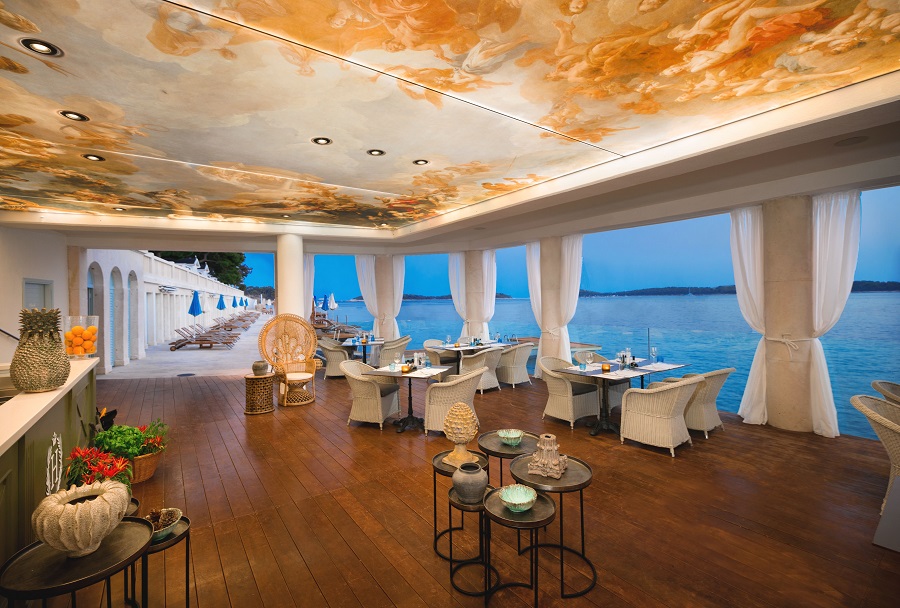
It was known as a city or public beach and was the center of Hvar’s daily tourist life during the 1920s and 1930s and a place where people and families would meet to have fun and rest.
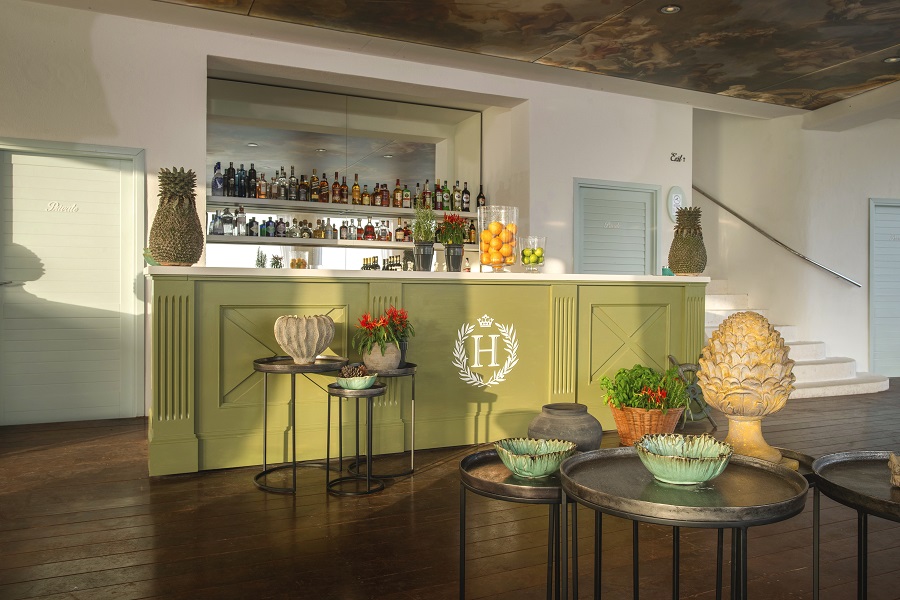
Beach Club Hvar is part of Sunčani Hvar Hotels, owned by CPI Property Group, leading real estate and hotel owner and operator in CEE Region.
You can learn more about Beach Club Hvar here.
For a comprehensive guide to Hvar Town, check out the Total Croatia Hvar in a Page.
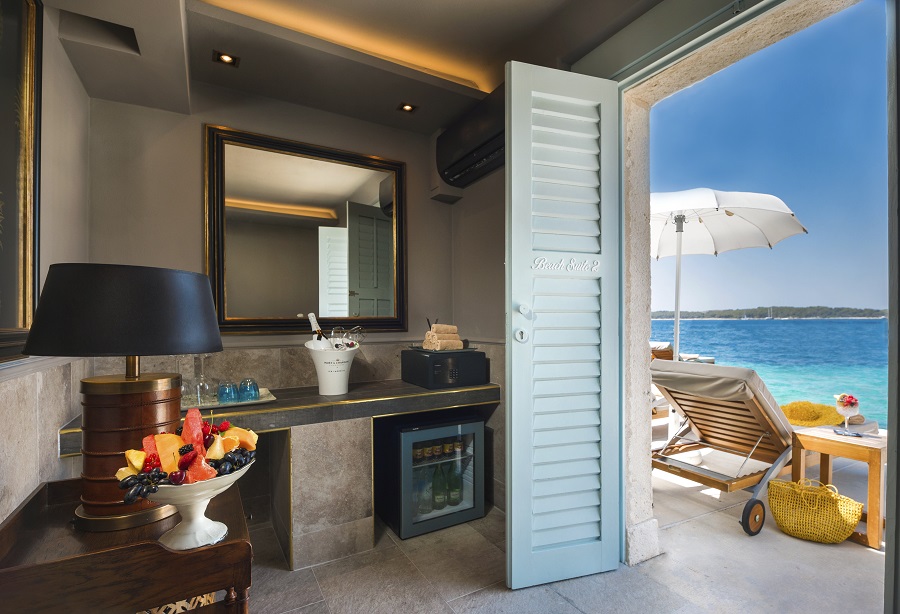
Over 8,000 Tourists in Dubrovnik Recorded During First July Weekend!
July 6, 2021 - Things are finally picking up in the Adriatic pearl, with over 8,000 tourists in Dubrovnik recorded during the first weekend of July!
According to the eVisitor tourist check-in and check-out system, 40,038 tourist arrivals were recorded in Dubrovnik in June 2021, while 13,297 arrivals were recorded in June last year, with 135,895 overnight stays in June 2021, while there were only 43,795 in June 2020, reports Dalmatinski Portal.
Most guests who stayed in Dubrovnik during June were from the USA, Croatia, Russia, Germany, France, Poland, Bosnia and Herzegovina, Ukraine, Slovenia, and Austria. According to the Croatian National Tourist Board's report for nautical activities, 2,223 arrivals and 16,337 overnight stays were recorded in June, which confirms the growth of the nautical season compared to June last year, when 859 arrivals were recorded, with 5,704 overnight stays, Dubrovnik.net reports.
Excellent tourist results, as well as intensified tourist traffic, were recorded during the first weekend in July, when 8,199 guests stayed in the city, compared to the first weekend of July 2020, when 2,778 guests stayed in the city. Most guests currently staying in Dubrovnik come from the USA, France, Germany, Poland, Croatia, Russia, the Czech Republic, Spain, Bosnia and Herzegovina, and Ukraine.
Currently, 32 hotels have been opened in Dubrovnik, and the opening of more hotel capacities has been announced by mid-July. Dubrovnik Airport is directly connected to about 40 destinations until mid-July, and direct flights with the United States began last weekend, a big step in recovering Dubrovnik's tourism.
According to the Visitor, from 1 January to 3 July 2021, 79,433 tourists stayed in Dubrovnik, and 256,821 overnight stays were realized. Most guests were from Croatia, the USA, Germany, France, Poland, Russia, BiH, Ukraine, Serbia, and Slovenia. From the total number of tourists from 1 to 3 July 2021, 43,767 guests stayed in Dubrovnik hotels, where 122,161 overnight stays were recorded, while 26,409 guests stayed in private accommodation in the stated period of time, achieving 98,010 overnights.
Follow the latest on flights to Croatia HERE and the latest travel updates and COVID-19 news from Croatia HERE.
For more on travel in Croatia, follow TCN's dedicated page.
Croatian Wellness Tourism Could Take Off Following Pandemic's End
July the 6th, 2021 - Croatian wellness tourism will likely be a big hit when the pandemic is over and people begin to become more aware of their surroundings and the need to take care of their health.
As Poslovni Dnevnik/Lucija Spiljak writes, throughout the ongoing coronavirus pandemic, physical health, physical and mental health care has increased, which, among other things, has confirmed the title of one of the fastest growing branches in the world, and with it wellness tourism as a sub-branch of health tourism.
Ana Toncic is the president of the Wellness Tourism Section at the Croatian Chamber of Commerce, associate of the Institute of Tourism and owner of Vita Vitalis, which has been providing consulting services in the fast-growing wellness and spa industry since 2019. She explained the ins and outs of the overall "wellness industry", which includes a wide range of activities, starting from the production of equipment and various accompanying inventory, through to all of the associated cosmetics to the turnover generated through the provision of wellness services.
"Wellness is associated with many areas of human activity, including tourism, medicine, architecture, sports, etc. The main role of wellness is to take care of one's health, ie maintaining the body and mind in a healthy way, fitness, physical and mental relaxation and maintaining inner peace,'' stated Toncic, adding that in recent years, wellness centres in the hotel industry have become ''must have'' products which contribute to the added value of hotels and the raising of the quality of provided services in general.
“Today, Croatian wellness tourism, in the sense of medicine, stands out mainly in dental tourism services. While globally, the medical wellness sector records an annual growth of 15-20%, Croatia can't yet boast of such a result. According to research, the average daily consumption of multi-day visitors in the wellness segment is 149 euros, in the spa segment 63 euros and in the medical segment 292 euros. According to household research, users of wellness services have the best paying power, followed by users of medical and spa services, according to the Institute of Tourism,'' added Toncic, noting that Croatia has seen an increase in the number of wellness centres available in recent years.
The categorisation of hotels and new trends and needs of guests contribute to this. But despite that, Croatia is still recognised as a destination of "sun and sea", and not enough as a destination for wellness and a healthy holiday.
"Therefore, the wellness sector is facing high challenges, primarily in terms of staff training and promotion of the product itself," said Toncic.
The problem of seasonality
Most of hotels with wellness centres are located along the coast, so there is a seasonal offer where wellness centres are open six months a year, usually from April to October. According to this expert, the exceptions are some such centres more awake to Croatian wellness tourism's potential, in Istria, Kvarner and in spas in continental Croatia, which provide their services throughout most of the year.
“Various wellness treatment services, programmes that include exercise, proper nutrition, relaxation techniques and the like are offered within hotels and tourist and health centres. Wellness tourism is an integral part of health tourism - wellness, spa and medicine. Medical wellness is based on preventive programmes to preserve health or raise energy. Anti-stress therapies, spine programmes, weight loss programmes and healthy eating lessons, as well as business relaxation treatments, are increasingly becoming part of the culture of living of citizens and attracting guests to a given destination throughout the year.
I think that for the guest, in addition to the wellness service, the overall wellness experience is much bigger - from walking around in nature, running, cycling, inhaling sea air, being around distinctive vegetation, a rich gastronomic offer and the kindness and smiles of the staff. All this is part of wellness and as such makes Croatia a country of special energy and healthy living,'' explained Toncic.
The coronavirus pandemic has forced the entire world to grind to a halt and has caused a terrible drop in the number of touristic overnight stays, and thus the use of wellness facilities. Many wellness facilities were not even allowed to be used (eg wet saunas) or were used to a greatly reduced extent.
According to Toncic, the standards of behaviour have changed and adjusted considerably since the pandemic struck, and Croatian wellness tourism has an opportunity to blossom.
"We replaced the handshake, greeting, hospitality and smiles with masks. Although maintaining the highest standards of hygiene has always been one of the main preconditions for successful work in wellness centres, this was given even more importance during the pandemic. Wellness centres have adjusted their offers, working hours and offered as many outdoor services as possible in the summer months. Thus, outdoor treatments, mobile wellness in camps and private spas are certainly services that have done well,'' she explained.
We can easily look back at earlier on in the pandemic and see how it significantly changed attitudes and views when it comes to travel, but also to healthcare in general, because most people have been travelling by car, choosing private apartments, mobile homes or holiday villas, with great emphasis on destination safety and hygiene and health.
Special emphasis is now often also being placed on programmes to strengthen immunity, wellness retreat programmes that include spending time in nature, meditation, yoga and the like. The emphasis is being placed on products from local family farms (OPGs), and therefore I can say that the market is changing and that there is certainly a greater responsibility being taken for healthcare and for nature,'' said Toncic, which shows that today's trends in the wellness industry nurture the notion of less being more, the use of natural eco-certified products, the listing of local products and the branding of the overall offer.
For more on Croatian wellness tourism, make sure to follow our travel section.
Overnight Stay Share Rises in June as Croatian Hotels Regain Momentum
July the 6th, 2021 - The share of overnight stays realised in Croatian hotels as the epidemiological situation improves thanks to vaccinations has risen, providing hope for the height of the 2021 tourist season which is yet to come.
As Poslovni Dnevnik/Marija Crnjak writes, unlike the first pandemic-dominated year in which Croatian hotels sadly had the lowest occupancy of all accommodation segments, hotels this year can be relieved at least in that regard, as can already be seen from the first tourist statistics.
Although the busiest traffic is still expected, in the first half of the year, Croatian hotels had 83 percent more overnight stays than last year during the same period, and in June there were as many as 2.8 times more overnight stays realised than in June last year. No less important, currently out of a total of 1187 Croatian hotels, 846 of them have been opened, 200 more than were open before the peak of the last summer season.
What has changed? There is also some maths to be looked at in this equation, as Croatian hotels were closed to a greater extent last year due to epidemiological measures than this year, but again, until recently the borders were barely open to tourists. With the vaccination programme giving tourism some optimism as opposed to the uncertainty of 2020, what has perhaps changed the most is the perception of guests this year.
This year, many guests see Croatian hotels as safe facilities, whose service and organisation of operations can guarantee guests will not get infected. This is due to the fact that last year no tourist staying in any of the Croatian hotels was recorded as having caught coronavirus from a facility. Then came the introduction of the national Safe Stay certificate.
"In 2020, Croatian hotels, when we compare all types of accommodation capacities, had the largest decrease in arrivals and overnight stays when compared to 2019. The index of arrivals was 24.36 percent, and overnight stays 27.12 percent. The lowest quality hotels had the smallest decline, which is proof that quality is in demand in the conditions of this crisis and is certainly a signpost for the future,'' pointed out Bernard Zenzerovic, the director of the Croatian Hotel Employers Association (UPUHH).
He noted that the success of this summer season will be measured by its length, if we're in the green all summer and during the post-season then we can expect great results.
Croatian tourism success will also be counted in terms of revenue, and Croatian hotels are known to be the strongest link in the sector in that regard, all the more so because the pandemic hasn't significantly lowered hotel accommodation prices.
Current figures from eVisitor from the Croatian National Tourist Board indicate that overnight stays spent in Croatian hotels in the first half of the year accounted for 23 percent of total overnight stays realised, compared to 19 percent last year. So far this year, the largest share of overnight stays of about 30 percent is held by private accommodation, which in the pre-pandemic year of 2019 was still slightly lower (27 percent), while hotel overnight stays in 2019 amounted to 35 percent of total tourist traffic.
With 3.5 million overnight stays (at 660 thousand arrivals), compared to 2019, family/private accommodation is currently at about 48 percent of turnover, while hotels are at 29 percent of the realisation of overnight stays when compared to 2019.
The Association of Hoteliers points out the data of the Hotel Benchmarking study conducted by the Faculty of Management in Tourism and Hospitality from Opatija, that in accordance with the increase in the number of overnight stays in June, the utilisation rate of work capacity in hotels increased from 7.18 percent in May 2020 to 26 , 97 percent in May 2021.
"But when we know that the capacity utilisation rate in hotels was 65.76 percent in May 2019, according to the same study, we can see that there's a long way to go ahead of us to reach that record year," explained Zenzerovic.
The quality of service and investment in numerous protocols have contributed to the growth of guests' trust in Croatian hotels, noted Zenzerovic.
"Croatian hoteliers have decided to create their own health & safety programmes and protocols, as well as branding, promotion and cooperation with international certification companies in order to emphasise this component that is currently crucial for guests. We've shown all guests that we know how to set up and manage hotel operations in a way that provides them with the pleasure of staying there while respecting epidemiological measures. This is exactly the capital we're bringing into the tourist year 2021. At the same time, projects such as "Safe stay in Croatia" raise the image of Croatia as a safe destination. All of the above gives us reason for optimism regarding the business performance of the hotels, and we expect a better season than last year,'' concluded Zenzerovic.
Vaccination is also considered an important link for optimism. Spring polls show that 70 percent of hotel staff want to be vaccinated against the novel coronavirus, and they are now dealing with an estimate that about 60 percent of the entire Croatian tourism sector has been vaccinated.
For more, follow our dedicated travel section.
Emmezeta Boss Says Banning Unvaccinated Customers Would be Problematic
July the 6th, 2021 - The Croatian Emmezeta boss has spoken out against the idea of only allowing those who are vaccinated, or those who have covid passports proving their negative test results to enter shopping centres.
As Poslovni Dnevnik writes, Slobodan Skolnik, President of the Management Board of Emmezeta, spoke on N1 Studio live about the announcements that unvaccinated people will not be able to enter shopping centres.
"We're worried, as usual, when measures are being taken that are not entirely clear. We have no details about them. It would be very good for the competent ministries and the Civil Protection Directorate to contact the HUP association and for all measures to be tested by the people who have to implement them in practice. It wouldn't be good to introduce an unenforceable or difficult-to-implement measure and one that would bring an additional burden,'' the Emmezeta boss stated.
He noted that they still don't have the exact details on what the measure should look like.
"I understand that this measure should replace the one about wearing masks. Shopping centres would be entered with a digital green pass and people who have it don't need to wear masks. I guess those who still want to wear masks could get into shopping centres without having a pass, maybe that’s the kind of mix in question.
If it were so drastic that those who aren't vaccinated cannot enter, it would greatly complicate the operation of such facilities. These facilities have a lot of entrances, they need more manpower, these are additional costs at hand. It would probably intimidate some people, some of them will feel that their rights are being violated because we know that vaccination is not mandatory. Every reasonable person advocates and encourages people to get vaccinated. We know that vaccination can reduce the number of people in hospitals and reduce the spread,'' the Croatian Emmezeta boss stated.
About how shopping malls should check who has a digital EU certificate, he said:
"You know how it goes, where a human is involved, there's a possible omission. Just wink at someone and walk inside. China has digitised it, there are readers everywhere. I don't know how long it would take for us to be digitally ready. But again, the problem remains with those who don't have a green certificate and who haven't been vaccinated.
He also said he didn't know if anyone from the shopping centres had actually contacted the government about these proposed new measures. He added that since the beginning of the pandemic, Emmezeta has been monitoring how many employees had to be isolated and how many were infected at any given time, adding that there was very little to speak of when it comes to isolation and infection within the company at all.
For more, follow our lifestyle section.
Croatian Hospitality Sector Says New Measures Will Destroy Them
July the 6th, 2021 - The Croatian hospitality sector is once again set to face the brunt of the epidemiological measures, stating that this will destroy them and that they may as well close their doors now.
As Poslovni Dnevnik writes, in addition to working only part-time, they are now no longer allowed to serve customers inside the bars and the current Croatian epidemiological measures have halved the number of tables they have available. As of July the 1st, facilities operating within the scope of the Croatian hospitality sector, such as cafes and cars, are not allowed to serve anyone who isn't sitting down at a table.
Just when some glimmer of hope that 2021's tourist season would be more similar to the one from pre-pandemic 2019 arose, the National Civil Protection Directoate has again stomped on that light.
The ban on serving guests who aren't sitting down at a table, if such a rule is adhered to at all, will see all of the bars on the steps in the Old City of Dubrovnik close their doors, Jutarnji list writes. These are all bars that have most of their tables inside, there are maybe two or three in front of the bar, and their main "terrace" is their steps.
''What they're doing is so funny, these rules have literally nothing to do with anything,'' said Albert, the owner of the Alberto bar in the heart of Dubrovnik's glorious old town. Just a little tucked away from Stradun, the restaurant lives off guests who assume their ''sitting positions'' on hard stone steps coupled with soft, spongy cushions.
''We've got 18 chairs outside, the others are standing or sitting on the steps. If they really insist that we all adhere to these measures, we can just close the bar now. Last year, in June and July, let us work until 02:00 in the morning, and then in August they brought us back to midnight again,'' this angry bar owner explained.
Albert took over this bar back in February last year, exactly 27 days before the pandemic struck Croatia and the very first lockdown.
''The money I had, I invested everything here. About half a million kuna. Until then I worked for others, now I needed it for myself, and I have three children and the bar is the only income for my family,'' he said.
He managed to sustain the business thanks to state support. If he hadn't been getting paid, he doesn't know how he'd have survived it all.
''I'd also like to ask them just where someone will work for 4000 kuna. We’ve done very little since I opened it, and now this. They just don’t let me work. One step forward, five steps back. And how do they intend to ban people from sitting on the stairs? Someone comes here and sits down. Drinks are served. What are they going to do, send the police out to come and arrest people?!'' Albert asked.
Other Croatian hospitality sector workers down in Dubrovnik also agree that the decisions being made by the National Civil Protection Directorate are idiotic and reckless. The issue will likely also affect many other Croatian destinations where sitting on the steps is the norm, including Rovinj in Istria.
For more, follow our business section.
Flora and Fauna of Dalmatia: Counting Arms of Seastars or Looking for the Good Luck Plant
July 5, 2021 - Swimming in the beautiful and crystalline waters of Croatia, what are the creatures that you are most likely going to meet? And walking around the mountains or the forests, which is the most interesting vegetation and the most unique? This article gives you a brief overview of some of the most interesting flora and fauna of Dalmatia, and how to spot them!
This is the first article written for Total Croatia News by our new contributor, Maria Sole Vespasiano, a molecular biologist living in Split.
Fauna of Dalmatia coastal waters
The waters are populated by many species of fish, mammalians, shells, and more, but you are not going to see all of them from the coast. Sitting on a beach it is not difficult to spot dolphins swimming only a few hundred meters away from the coast. This happens especially when it is not high season yet and ferries, boats, and catamarans are not making the waters too busy for dolphins to feel comfortable enough to appear. Did you know that dolphins can understand approximately 60 words, which can make up to 2000 sentences? They are even able to communicate over the phone! If you are a fan of these beautiful and super-smart animals, in Dalmatia you may have the chance to see them very closely! Another way to see dolphins, and maybe even swim with them, is having a sailing trip a bit further from the coast. In this case, the dolphin watch is almost guaranteed. Their sinuous movement in the waves will be a beautiful memory to take home from your vacation.
Looking around rocks you can find sea stars, and this is way easier on islands! Most likely not everybody knows that sea stars can reproduce by scission of their body. They can also detach one of their “arms” when attacked to be able to escape and save the rest of the body. If you accidentally find one of these sea stars with one shorter (or half of their) arm/s, please do not disturb: either it is recovering from the attack of a predator or a new life is flourishing!
Another water animal that widely proliferates near the Dalmatian coast is the sea urchin. They find their home on the stones, and the backdrop of the Dalmatian coast is made of small or bigger stones, which makes it the perfect location for them. Stepping on one of these sea animals can be very painful! On the other hand, they are also proof of clean waters, because the accumulation of heavy metals disrupts their growth. When you spot them feel lucky to swim in the same water and watch out where you put your feet!
Flora of Dalmatia
The forests and the mountains are often populated by foreign species, especially when these are invasive and they grow faster and easier than the indigenous ones. However, in the Marjan forest in the heart of Split, around 30 endemic species were found. Three of them, in particular, caught my attention during a visit to Marjan hill with experts that are working on a map of all the plants present on Marjan.
The first one is Aurinia leucadea. It is a plant that grows on rocks and has beautiful yellow flowers. It grows mainly in Dalmatia and in some other rare locations of the Mediterranean. They say its name comes from Greek αϋρα that means breeze, wind. In fact, this plant lives on the rocks of mountains in very windy regions, like Dalmatia. The rocky part of the Marjan forest is always fully exposed to the wind, and this creates a perfect environment for this plant.
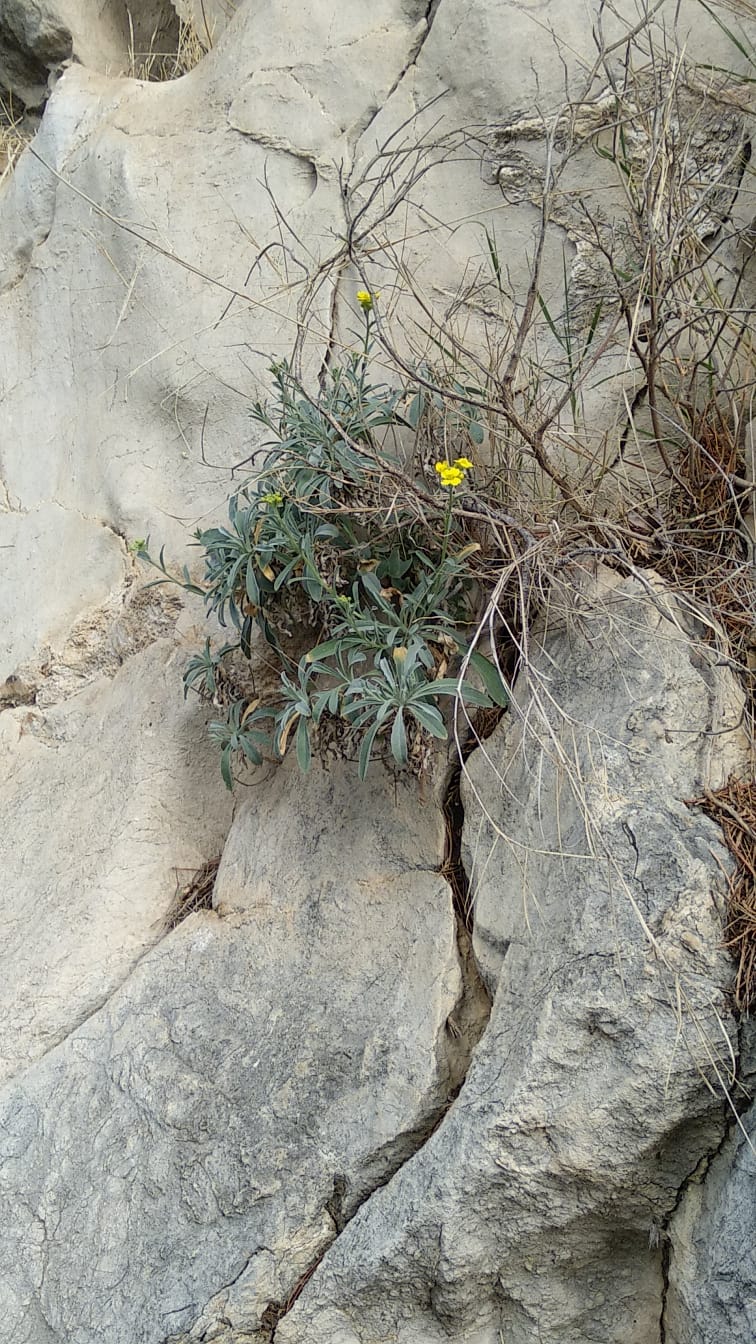
(Aurinia leucadea; all images taken by the article's author, Maria Sole Vespasiano)
Another interesting one, also from the family of Aurinia is the Aurinia sinuate, an endemic plant that grows only on the Adriatic coast. Its characteristic is that the particular red seeds are protected in little spheres as you can see in the picture below. This plant also blooms yellow flowers, but not in the season I took the picture!
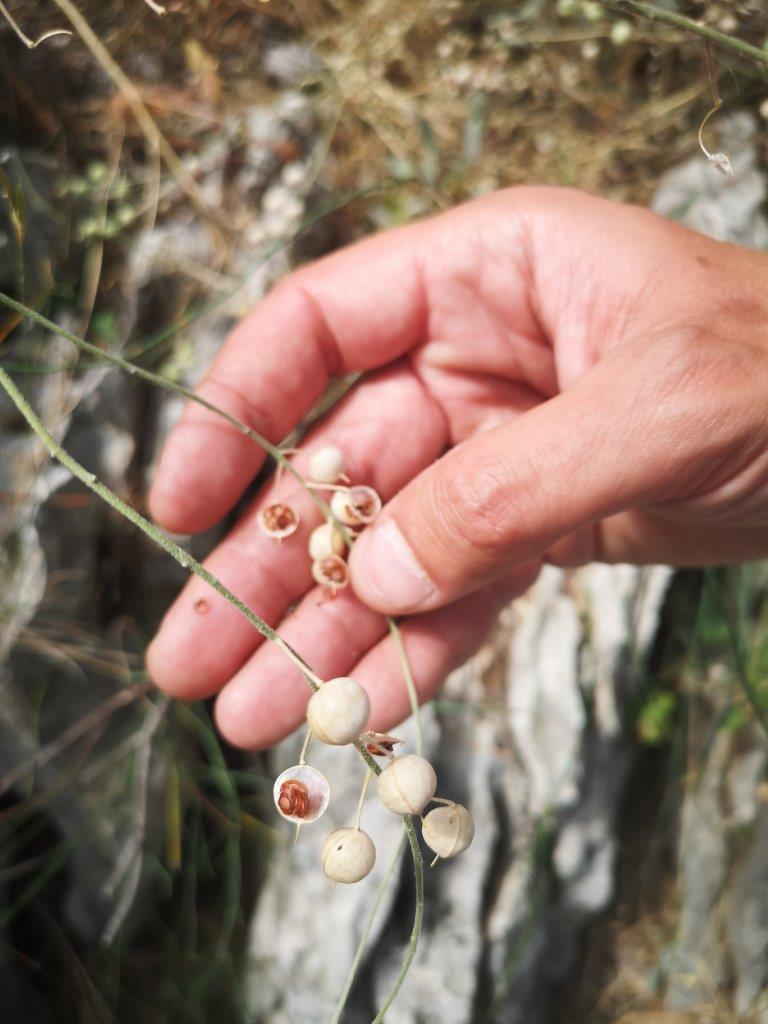
Last but not least, Goniolimon dalmaticum. This plant only grows in Dalmatia and the experts were looking for it in the Marjan forest for weeks. The specimen is the only one they found so far in Marjan park. I challenge you to find it! Many years of luck to the one who will spot it, according to the legend! I will give you a little tip: it is able to grow in an extreme environment, with the high salinity in the soil. Have a look close to the coast!
Find out more about the plant species of Marjan in this article.
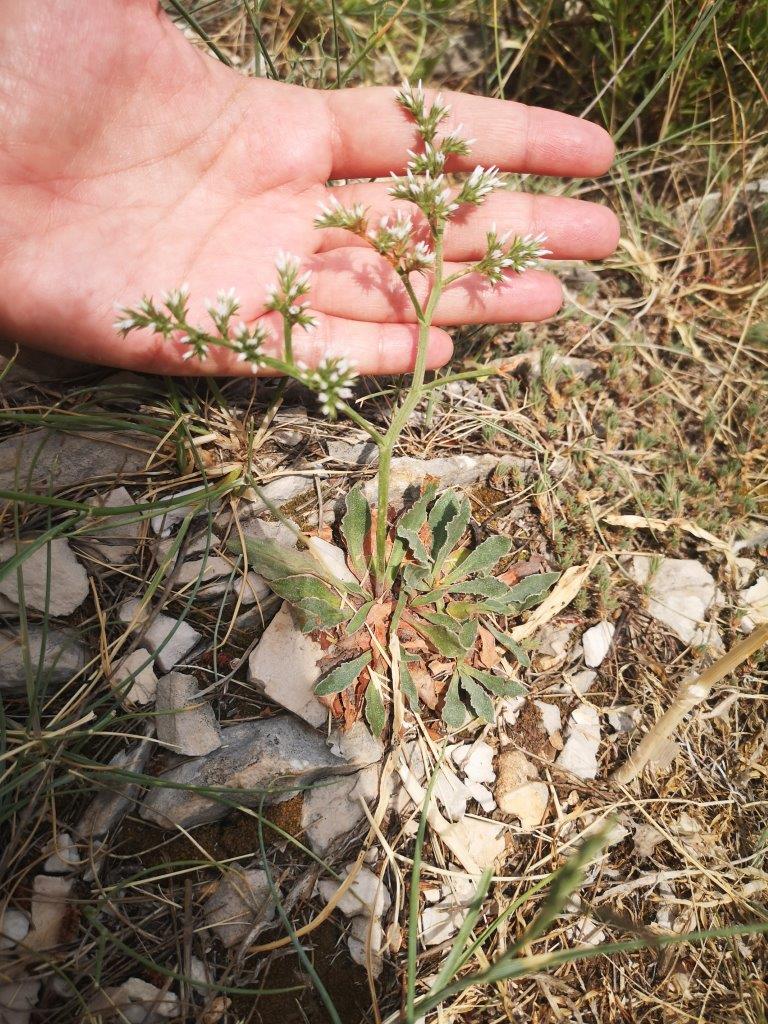
Big thanks to Split Scouts and Igor Belamaric for taking me to Marjan, and explaining the flora of Dalmatia.
Huge News: Bugatti becomes Bugatti Rimac with Headquarters in Croatia!
July 5, 2021 - Mate Rimac's company Rimac Automobili has become the majority owner of Bugatti, and Rimac Automobili becomes Rimac Group divided into two companies - Bugatti Rimac and Rimac Technology.
This was announced this afternoon by Rimac Automobili. This confirmed the speculations that Rimac would take over Bugatti, a famous company known for super-luxury cars, reports Index.hr.
Mate Rimac accompanied the announcement of this news on Facebook with a photo showing Nevera, Bugatti, and Porsche on the runway.
More information about this great event will be announced tonight in Dubrovnik. In addition, speeches by Mate Rimac, founder and CEO of Rimac Automobili, Oliver Blume, CEO of Porsche, and Lutz Meschke, vice president and chief financial officer of Porsche, have been announced.
Rimac Automobili says it is at a "turning point in the company's history," and the move, which became public today, is described as "merging with the icon of car brands, Bugatti Automobiles, into a new automotive and technology company."
In just 10 years, Rimac Automobili has progressed from a startup and one man in a garage to create a new company Bugatti Rimac d.o.o., in collaboration with two of the most famous and powerful car brands in the world - Porsche and Volkswagen Group, the statement said.
This Croatian brand has proven that it can keep up and open new vistas, imposing performance and technology standards on others. Combining Rimac's technical knowledge and efficient business with 110 years of design tradition and a strong Bugatti brand is leading to the emergence of the most important company in the hypercar market, Rimac Automobili announced.
Rimac Group will be the largest shareholder of the new company Bugatti Rimac d.o.o., with a share of 55%. Mate Rimac will retain its existing stake in the Rimac Group of 37%, Porsche remains at 24%, Hyundai Motor Group at 12%, and other investors at 27%. The development, production, and delivery of battery systems, powertrains, and other EV components, for which Rimac is known and gained the trust of many car manufacturers, will be separated into a new business entity - Rimac Technology - which the Rimac Group will wholly own. Rimac Technology remains an independent company that cooperates with many global car manufacturers, according to Rimac Automobil, from which they also sent an infographic of the new ownership structure.
Mate Rimac will head the new company. As CEO of the Rimac Group, he will lead Bugatti Rimac and the new company Rimac Technology. With this, Mate Rimac continues to manage all business segments of the Rimac Group, which now includes Bugatti. Bugatti and Rimac continue as separate brands, retaining existing production facilities and distribution channels, while the headquarters and all development for both brands will be in Croatia.
The Rimac Group will continue to innovate, create its own hypercars and develop systems and technologies for many of the world's car manufacturers. Such innovative technology will be applied in future Bugatti models, Rimac Automobil said in a statement.
Both brands, Rimac Automobili and Bugatti, will continue to develop car models within the new company. In the future, Bugatti Rimac's global headquarters will be located at the new Rimac campus, which will also be the headquarters of Rimac Technology, as well as the production of technology and components for cars of both brands, while the assembly of the Bugatti model will continue in Molsheim, France, thus continuing to use the historical location, which is inseparable from the Bugatti brand. The 200m-euro campus, with a building area of 100,000 m2, which should open in 2023, will be the base for all research and development of future Rimac and Bugatti hypercars. Conceived as the core of high-tech innovation, the Rimac campus will bring together 2,500 people driven by shared curiosity and a desire to reach extremes, the statement said.
Commenting on today's announcement, Mate Rimac, founder and CEO of Rimac Automobili, said: "This is an exciting moment in the short but turbulent history of Rimac Automobili. We have gone through so much in so little time, but this new project takes things to a whole new level. Rimac and Bugatti complement each other perfectly. As a young, agile, and fast automotive and technology company, we have won the trust of our partners and a strong position in the high-performance electrical technology industry.
With Nevera, we have also proven that we can develop and produce outstanding hypercars, which are fast and exciting, and high quality. Bugatti has more than a century of experience in engineering excellence and one of the most impressive car lines.
We recently unveiled our latest hypercar, the Nevera, which was met with positive reactions from professional media and automotive enthusiasts worldwide. I am therefore extremely excited about the potential that is combining the knowledge, technology, and value of these two amazing brands in creating some exceptional projects. In addition to creating new and exciting cars, we want to create an extremely successful and profitable company, which will be successful for the next 100 years," said Rimac.
Oliver Blume, CEO of Porsche AG, said:
“We combine Bugatti’s strong expertise in the hypercar business with the enormous innovative power of Rimac in the up-and-coming field of electromobility. In this joint venture, Bugatti brings its brand of rich tradition, icons, a base of loyal customers, and a global network of dealerships. In addition to technology, Rimac is introducing a new development and organizational approach."
Lutz Meschke, Deputy Chairman of the Management Board and Member of the Management Board for Finance and Informatics of Porsche AG, said: "We bought our first stake in Rimac three years ago and have since increased it successively. This has allowed us to build a close relationship with Mate and his highly innovative team. We now benefit from the investment. Rimac helps us with his knowledge to successfully introduce an emotional and important brand of the Group into the future. I am very proud and happy that we have completed this joint investment despite many challenges. This is an important day for Bugatti, Porsche, and the entire Volkswagen Group."
For more about business in Croatia, follow TCN's dedicated page.
Croatia To Be Represented By 58 Athletes in Tokyo Olympic Games
July 5th, 2021 - The Croatian Olympic Committee has announced a final list of athletes for the Olympic Games in Tokyo, which will take place from 23 July to 8 August.
The list includes 58 athletes, 38 men, and 20 women in 15 sports. Among them is only one team, notably the national water polo team who nominated 12 players and one alternate.
This will be the smallest number of athletes competing under the Croatian flag since the country's debut in the Olympic Games in Barcelona in 1992 when 41 athletes in 12 sports represented Croatia. Conversely, the largest number of Croatian athletes participated in London in 2012, when 107 athletes competed in 18 sports.
In Tokyo, Croatia will compete in athletics, boxing, gymnastics, judo, karate, kayaking and canoeing, rowing, sailing, shooting, swimming, table tennis, taekwondo, tennis, water polo, and wrestling.
For more follow TCN's dedicated page.
Arbitration Cases Against Croatia Concerning CHF Loan Conversion Suspended
July 5th, 2021 - Four arbitration cases brought by banks against Croatia before the International Centre for Settlement of Investment Disputes (ICSID) connected with the conversion of CHF-denominated loans were suspended on 30 June, the government and ten banks said in a joint statement on Monday.
The cases concerned the amended Consumer Credit Act and Credit Institutions Act based on which loans denominated in Swiss francs were converted into euro or kuna denominated loans. The conversion triggered a series of legal cases before different courts.
On 30 June, Intesa Sanpaolo Holding International, Privredna Banka Zagreb, Sberbank Europe and Sberbank d.d. Zagreb renounced the possibility of pursuing legal action in such cases, and Raiffeisenbank International and Raiffeisenbank Austria d.d. withdrew their case before the Commercial Court in Zagreb.
The joint statement was signed by the government and OTP Bank, Erste Group Bank, Raiffeisen Bank International and Raiffeisenbank Austria, UniCredit Bank Austria and Zagrebačka Banka, Intesa Sanpaolo Holding International and Privredna banka Zagreb d.d., and Sberbank Europe and Sberbank d.d. Zagreb.
The government said it appreciated the credit institutions' constructive approach to unresolved issues and their recognition of the positive effects of the government policy aimed at aligning Croatian legislation with the EU's acquis communautaire and adopting the euro as legal tender in Croatia.
The credit institutions acknowledged the government's commitment to resolving the outstanding issues and the government's efforts to create a stimulating business environment.
Two arbitration cases, brought against Croatia by Addiko Bank AG and Addiko Bank d.d. and by Société Générale S.A., and a case initiated by Addiko Bank d.d. before the Commercial Court in Zagreb continue. In cooperation with the State Attorney's Office, the government will continue to take all the necessary steps to protect the interests of the state, the statement said.
Speaking at a press conference in February, Finance Minister Zdravko Marić said that thanks to the agreement reached with the banks, the potential payment of at least HRK 2.5 billion from the state budget was avoided, adding that HRK 482 million related to the lawsuits before the Commercial Court in Zagreb and about HRK 2 billion to the lawsuits before the ICSID in Washington.
Marić said that Croatia had paid HRK 127 million for court costs, the costs of lawyers and expert witnesses, and similar costs for the cases before the ICSID.
For more, follow TCN's dedicated page.


